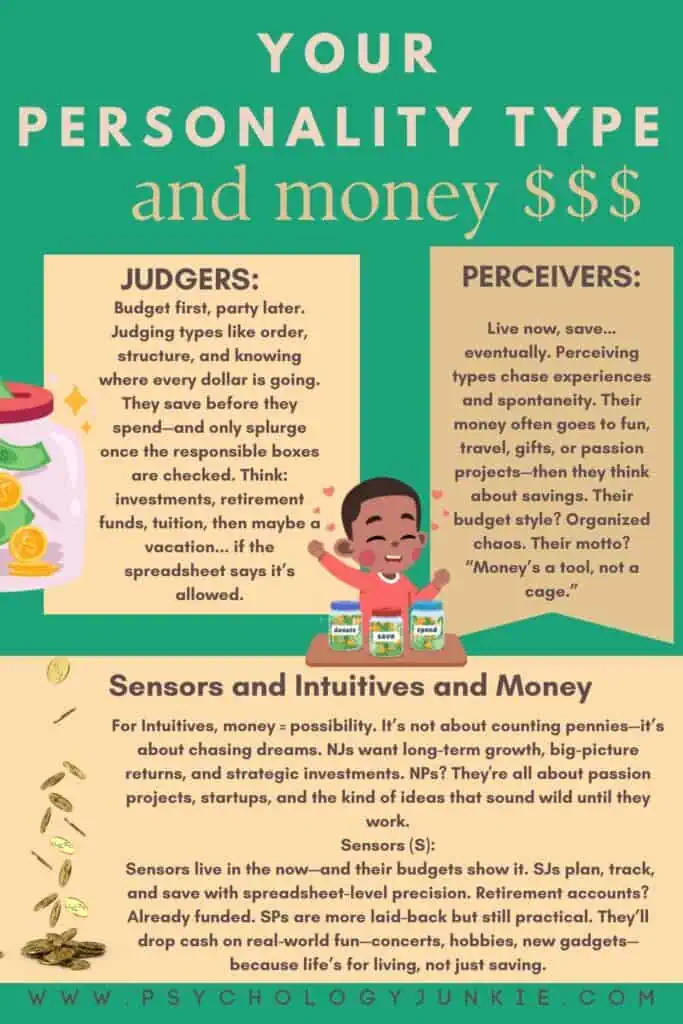Over the past couple of weeks, I’ve spent a while researching the consequences of persona kind on cash administration. Should you’ve ever puzzled why cash appears to slide by your fingers, or why you’re harassed about funds on a regular basis, maybe your persona kind has a component to play! As we speak we’re going to have a look at the affect your kind has on the way you assume and really feel about funds. Let’s get began!
Unsure what your persona kind is? Take our new questionnaire right here!

Discover out your youngster’s persona kind right here!
I hyperlink to 1 e book on this article that’s an affiliate hyperlink. Which means that when you purchase that e book I get a small share to make use of in direction of holding this website working.
Estimated studying time: 12 minutes
Your Myers-Briggs® Persona Sort and Your Relationship with Cash


Judging and Perceiving – the Largest Distinction
Judgers and perceivers have a tendency to have a look at cash in essentially other ways. In keeping with Otto Kroeger, previous president of the Affiliation of Psychological Sort, and a present member of the Nationwide Coaching Laboratory Institute (NTL) of Utilized Behavioral Sciences, Judgers have a tendency to right away get monetary savings, whereas Perceivers deal with spending.
“The Judgers’ record is at all times organized and neat and their responses are often numbered and bulleted. Their record at all times displays a conservative strategy to cash based mostly on the premise that having cash is the direct results of arduous work and accountable dwelling.”
Among the many record of issues that Judgers prioritized with their cash had been Investments, Budgets, Training, and Retirement. After all of the “accountable” issues had been accomplished with the cash, they might take a look at spending it, however solely after their safety was taken care of.
Perceivers, in distinction, centered on spending the cash earlier than saving it.
“The remainder of the (Perceivers’) record continuously isn’t an inventory in any respect however an obvious stream-of-consciousness outpouring which may be written anyplace on the sheet, by anybody within the group, in any of a wide range of colours and kinds. (Simply trying on the sheet drives the Js loopy, as they establish this as typical of how Ps keep their funds.)”
Among the many record of issues that Perceivers prioritized with their cash had been Enjoyable, Holidays, Fulfilling a Dream, Shopping for Items, Giving to Somebody who Wants It, and Enjoyment. After all of the spending was accomplished, then they might deal with financial savings and investments.
Clearly, there are at all times exceptions to those research. There’ll at all times be the odd Judger who mixes up spending with saving, or the uncommon Perceiver who focuses on investments and retirement over enjoyment and enjoyable.
You could find out extra about Kroeger’s research on persona kind and funds in his e book, 16 Methods to Love Your Lover: Understanding the 16 Persona Varieties So You Can Create a Love That Lasts Perpetually.
Which Methodology is Finest?
There are good and unfavorable issues about each methods of managing cash. Judgers are typically extra cautious and deliberate, caring for extra security-related issues. This could imply that they’ve extra of their financial savings account in case of an emergency. Nevertheless, they will turn out to be so fixated on saving and securing cash that they lose sight of the enjoyment it could actually present! They’ll overlook to make use of cash to complement their lives, and in worst-case eventualities, they will seem like Ebenezer Scrooge, counting all their cash and storing it away whereas forgetting to see its worth in being loved and serving to others.
Perceivers get pleasure from utilizing cash to amass thrilling experiences. They love the spontaneity they will get pleasure from with their cash, however they could additionally wind up in a disaster when an emergency occurs they usually don’t have something of their financial savings account. For these sorts, they could get so fixated on the short-term positive factors of spending cash that they lose sight of the long-term safety that comes from saving and investing.
Judgers and Perceivers each have one thing to study from the opposite with regards to issues of cash administration. Judgers can study to complement their life with the gorgeous experiences cash can present. Perceivers can study to put aside cash fastidiously in order that when emergency strikes, they aren’t left empty-handed.
Persona Varieties and Cash in Extra Element:


ESTJs and ESFJs
These sorts are among the most structured with regards to cash. They like detailed, particular budgets and can stability them to the tee. Budgets? Nailed. Retirement plans? Already in movement. School financial savings? You higher consider little Timmy’s future tuition is accruing curiosity proper now.
After they really feel safe, that’s when the enjoyable kicks in—simply not the form of enjoyable that entails irresponsibly shopping for crypto. We’re speaking top-tier dwelling home equipment, ergonomic furnishings, and possibly a Costco-sized membership to someplace fancy. ESTJs lean into high-return investments and strategic threat. ESFJs? They’ll drop money on items that make individuals cry glad tears, curated experiences, and the occasional designer outfit that claims “I’ve my life collectively.”
ISFJs and ISTJs
These sorts are all about saving for a wet day. Detailed and exact with their budgets, ISJs prioritize paying their payments and having their financial savings accounts well-padded. They’re the kinds attending Dave Ramsey seminars with highlighters and backup pens. In keeping with the MBTI® Handbook, ISTJs mainly run the accounting world, and yeah, we consider it.
They crush payments, repay money owed early (only for enjoyable), and hold emergency funds trying like mini belief accounts. After they lastly deal with themselves, it’s sensible consolation all the best way: sturdy furnishings, acquainted eating places, and the one trip spot they return to yearly as a result of “why mess with perfection?”
ESTPs and ESFPs
Cash is about expertise and delight for these two persona sorts. They need to stay life to the fullest, and cash is s a useful resource that they will use to make that potential. Spontaneous journeys the world over, tickets to music festivals, or placing cash down on daring enterprise ventures provides pleasure to their lives. They don’t thoughts taking some monetary dangers, particularly if the reward appears inside the realm of plausibility. Entrepreneurially-minded, they really feel like taking part in it protected means lacking out on among the pleasure and thrill life has to supply. As these sorts get into mid-life they have an inclination to prioritize saving extra, however they are going to at all times strive to ensure they’ve some “wiggle room” for spontaneous adventures and enjoyable.
ISTPs and ISFPs
Cash for these two is mainly freedom tokens. They save, sure—however in addition they spend, as a result of what’s the purpose of getting cash when you’re not gonna do one thing cool with it? These sorts wish to hold an emergency fund simply in case issues go sideways… but when that “emergency” occurs to be a once-in-a-lifetime journey or a classic bike, so be it.
ISTPs may put money into one thing low-key sensible like photo voltaic tech or a winery. ISFPs will put cash towards their passions, their dwelling aesthetic, or serving to a good friend by a disaster. They don’t care a lot about standing—however they do care about consolation, high quality, and having tales to inform.
ENTJs and ENFJs
ENTJs and ENFJs assume long-term, they usually’re not right here to fiddle. Retirement planning? Examine. Investments? Already diversified. However not like their Sensing cousins, these two don’t fuss over each penny—they take a look at cash prefer it’s potential vitality ready to blow up right into a legacy.
They’re the kinds who’ll put their money into startups, scholarships, or inventory portfolios that scream “future billionaire.” ENFJs may additionally funnel funds into ardour initiatives or nonprofit goals. Each sorts care much less about hoarding wealth and extra about utilizing it to make an affect—whether or not that’s by enterprise, schooling, or globe-hopping for inspiration.
INTJs and INFJs
INTJs and INFJs don’t simply ask “how do I spend cash?”—they ask “what does this spending say about my function in life?” These sorts are strategic savers, however not obsessive about greenback indicators. INTJs need return on funding. INFJs need return on which means.
You received’t discover them blowing money on regardless of the influencer of the week is pushing. As an alternative, they’ll pour funds into greater schooling, journey with function, and hobbies that stretch the thoughts. Artistic instruments, religious retreats, possibly a language-learning app that prices greater than it ought to—they’re in. Furnishings? Meh. They’ll hold the identical sofa for a decade if it nonetheless has lumbar help.
ENFPs and ENTPs
Not afraid of dangers, these sorts see cash as a method to stay life to the fullest and broaden their experiences and understanding. These two are much less involved with retirement plans and extra involved with what number of locations they will go to earlier than 40. Or what number of enterprise concepts they will pitch earlier than lunch.
Budgets are extra of a imprecise suggestion than a strict rule. They’re not irresponsible—they simply consider cash is supposed to maneuver, not sit round in a dusty financial savings account. Over time, they may develop higher monetary habits, however they’ll at all times need some “mad cash” to throw on the subsequent huge thought. Books, workshops, aircraft tickets, start-ups—they’re all truthful recreation.
INFPs and INTPs
These two deal with cash prefer it’s a obligatory evil—or a helpful magic spell, relying on the day. INFPs and INTPs spend on what feeds their soul, not what pads their pockets. Which may imply splurging on journals, devices, books, or mountaineering boots that’ll survive a zombie apocalypse.
They’re not reckless—they simply don’t care about maintaining with anybody. Payments receives a commission (ultimately), financial savings exist (in idea), and most purchases are weighed towards how a lot pleasure or curiosity they’ll convey. Residence comforts matter, however title manufacturers and standing symbols? Probably not. They’d fairly fund their subsequent artistic obsession than purchase a modern espresso desk that nobody’s allowed to the touch.
Instinct and Sensing – Specifics versus Huge-Image
Right here’s the deal: Intuitives deal with cash like an idea. An vitality supply. A gateway to chance. They dream huge, spherical numbers, and don’t at all times observe each greenback—as a result of they’re busy imagining the way it may multiply. NJs need large returns. NPs need to fund their ardour initiatives and low-key revolutionize the world.
Sensors? They’re within the particulars. Particularly the SJs. They observe bills like hawks, stability budgets right down to the penny, and think about cash as a bodily software that solves real-world issues. SPs are a little bit looser, however nonetheless grounded—they’d fairly spend on now than financial institution on sometime. SJs are the retirement planners. SPs are the expertise seekers.
In keeping with a case-study, Sensing-Perceivers are the kinds least more likely to plan for his or her retirement, whereas Extraverted-Judging sorts are those most definitely to plan for retirement. Sensing-Perceivers usually tend to spend their cash on experiences that enrich life, whereas Sensing-Judging sorts usually tend to save their cash to construct up a safety web.
Pondering and Feeling
In relation to funds, Pondering sorts see cash as a chance to have energy and success. They view it as a software to maximise their skills in life, and there’s nothing notably private about it.
Feelers, in distinction, might have loads of guilt surrounding cash. They usually sense that it fosters greed, they usually see it extra personally. Whereas they see monetary success as a method to fulfill their goals, in addition they fear about turning into too enraptured by it. Even so, there are not any appreciable variations that I may discover in how these two preferences present up with regards to cash. Each like to make use of cash to supply assets, assist enhance their station, and foster progress and improvement.
Suggestions for Dealing with Monetary Points with Your Companion:
When Your Companion is a Sensor…
- Recognize your associate’s pragmatic angle in direction of cash.
- Take note of the specifics and particulars.
- Keep in mind that when budgeting they are going to need particular numbers, not rounded numbers.
- Assist them see future potentialities with out being condescending about their perspective.
When Your Companion is an Intuitive…
- Let your associate know your particular monetary wants.
- Give particulars that can assist to encourage your associate’s big-picture concepts.
- Allow them to speak about how they might use the cash to get a return sooner or later.
When Your Companion is a Pondering Sort…
- Recognize your associate’s objectivity about cash.
- When there are monetary disagreements, strive to not personalize it.
When Your Companion is a Feeling Sort…
- Bear in mind that you simply may view cash otherwise. You may use cash to collect assets, and she or he may purchase items or sentimental objects or experiences. Don’t personalize or criticize.
- Keep calm throughout monetary disagreements. Allow them to find out about monetary limits and particulars with out imposing guilt.
When Your Companion is a Judger…
- Work out early on how you’ll handle funds as a workforce. Determine on roles, obligations, objectives, and the way you’ll get there.
- Keep in mind that your associate will turn out to be harassed when there’s a poor plan or construction with cash. Budgeting and having clear objectives helps them really feel safe.
- Clarify why cash ought to be saved, however why it also needs to be used to have some spontaneous enjoyable and enrich life.
- Present appreciation for the monetary safety and construction they carry to the desk.
When Your Companion is a Perceiver…
- Determine early on who may have the key roles relating to funds.
- If potential, put aside “play cash” in your price range for spontaneous enjoyable.
- Make focusing in your objectives enjoyable, and take a look at to not get condescending when/when you see how cash ought to be used otherwise.
- Present appreciation for the enjoyable experiences and adaptability they carry to the desk.


What Are Your Ideas?
Do you discover any stark variations in how individuals of various sorts deal with cash? Tell us what you assume within the feedback!
Discover out extra about your persona kind in our eBooks, Discovering You: Unlocking the Energy of Persona Sort, The INFJ – Understanding the Mystic, and The INFP – Understanding the Dreamer. You may also join with me by way of Fb, Instagram, or Twitter!


Different Articles You Would possibly Get pleasure from:
Right here’s What Job Satisfaction Means to You, Primarily based on Your Persona Sort
Why You Ought to Be an Entrepreneur, Primarily based on Your Persona Sort
The Profession Nightmare of Each Persona Sort
Right here’s How You Procrastinate, Primarily based on Your Persona Sort



